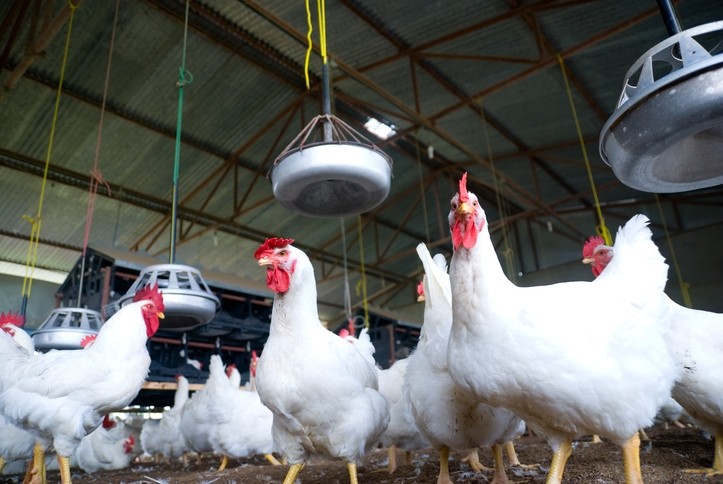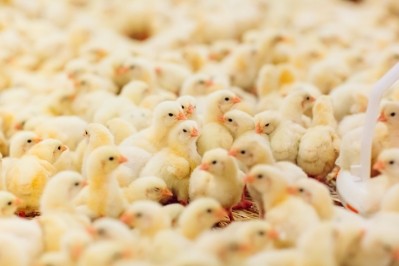Cracking the code: How can poultry farmers navigate heat stress in barns?

Broilers and turkeys are especially vulnerable to heat stress due to their inadequate means of regulating body temperature, notably their limited capacity for sweating, says an expert.
"When you consider the physiology of birds, notably their lack of sweat glands, panting becomes crucial for heat dissipation from their bodies. Coupled with their fast metabolic rate converting feed into meat, they generate substantial heat. This predisposes them to heat stress. Consequently, producers have been adapting facilities to manage heat and ensure the birds' comfort and optimal productivity,” Dr Brian McComb, technical consultant at Elanco Animal Health, told FeedNavigator.
Nutrition can play a crucial role in alleviating the adverse effects of heat stress. Some nutritional strategies include vitamin supplementation, which have effects on growth performance and immune function, electrolyte balance, which supports water retention and prevents dehydration, improving overall bird welfare, and feed additives that enhance nutrient absorption and immune function.
By prioritizing nutrition, poultry producers can ensure the health and productivity of their flock, even under heat stress, he says.
Too much of a good thing can be detrimental to the birds' health
"It's crucial to continually remind people of the impending heat stress, keeping it at the forefront of their minds. Even in regions where heat stress might not seem as pressing, it's essential to remain vigilant.
“Some products on the market may inadvertently predispose birds to more heat-related issues. Thus, it's vital to support producers in making informed decisions at every level."
Acute or chronic stress
When sampling producers across the US, it is evident that perceptions of heat stress vary widely, depending on whether it is acute or chronic, according to Dr McComb.
“Having worked extensively in the upper Midwest, our concern was often acute heat stress events, where sudden spikes in temperature could endanger bird survival. Conversely, in regions like the broiler belt, where summers are consistently hot, focus shifts to managing chronic heat stress. Here, the emphasis lies on maintaining bird comfort through facility design and optimizing nutrition to sustain feed conversion rates and weight gain."
When a bird experiences heat stress, its natural inclination is to reduce movement, drink more water, and eat less food, disrupting its normal routine and feed intake. This can lead to a cascade of issues, comments Dr McComb.
"It's crucial to recognize that heat stress affects various physiological aspects, including metabolism and immunity, impacting bird behavior and performance. Moreover, heat stress can disrupt gut health, potentially leading to dysbacteriosis and increased food safety risks due to the spread of pathogens into the bloodstream."
Bolstering immunity
Birds typically eat in the morning, and as they digest their feed, it generates heat. If they consume food during the hottest part of the day, this can exacerbate heat stress. “To mitigate this, producers can consider feeding birds later in the evening when temperatures are cooler, allowing them to digest food when it's less likely to raise their body temperature significantly. Additionally, supplementing birds with nutrients like vitamin A, vitamin C, and vitamin E can support their immune system, which may be compromised during heat stress, as these vitamins can scavenge free radicals."
Moreover, given that birds lack sweat glands and rely on panting to reduce heat, this process can elevate the pH levels in their blood: “Consequently, supplementing with sodium bicarbonate is a frequent practice to maintain a balanced acid-base level. Additionally, during acute periods of heat stress, some producers opt to supplement electrolytes in the birds' water for a few days to help mitigate the effects of heat stress."
Prebiotics and probiotics play a crucial role in maintaining gut health, especially during periods of heat stress when tight junctions may be compromised, continues the Elanco representative.
Knowledge gaps
Temperature is one of the most significant stressors impacting poultry production having significant effects on the health and productivity, according to a recently published paper.
The authors, based at Purdue University in the US, note that selective breeding over the decades resulted in fast growth and high feed efficiency in poultry, but these traits are associated with high metabolic rates and increased susceptibility to heat stress. Therefore, it is important to investigate the effects of heat stress on poultry production and to develop strategies or management practices to mitigate its negative effects, they remark.
“Our current knowledge and understanding of the mechanisms through which heat stress (HS) resulting from global warming affects the welfare, behavior, immune response, production performance, and even transgenerational effects in poultry are still incomplete.
"Further research is needed to delve deeper into these mechanisms to gain a comprehensive understanding. Numerous studies have investigated various biomarkers of stress in poultry, aiming to identify reliable markers that can accurately assess the physiological status and well-being of birds. However, there is a significant amount of variation and inconsistency in the results reported across different studies. This inconsistency highlights the need for more standardized methods and assays and a clearer understanding of the factors that influence these biomarkers in poultry.”
Excess supplementation concerns
Poultry producers should consider consulting with their nutritionist before the onset of heat periods to discuss potential water supplements. While some additives are already present in the feed, it's essential to avoid unintentionally exacerbating issues by introducing excess substances into the water, warns Dr McComb. Too much of a good thing can be detrimental to the birds' health, so careful consideration is crucial to ensure that any additional supplements in the water are beneficial without causing harm, he warns.
In addition to focusing on nutritional health, it's important to acknowledge the role of equipment and barn activities in mitigating heat stress. “However, these measures are only effective if they are properly maintained and prepared for use when heat stress occurs. Ensuring that equipment is functional and ready to deploy is essential for maximizing their effectiveness in managing heat stress."














